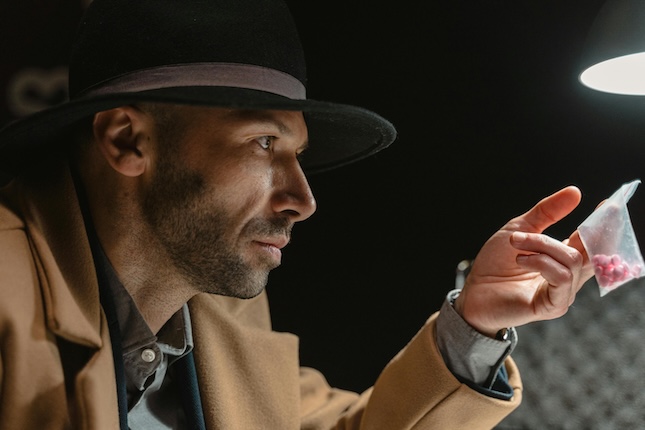From Idea to Icon: Create Your Standout Mystery Detective

Have you ever wondered what makes some mystery detectives so unforgettable? From Sherlock Holmes’ sharp wit to Hercule Poirot’s meticulous methods, iconic detectives have a way of captivating readers and becoming timeless figures in literature. Whether you’re an aspiring writer or an experienced author looking to refresh your approach, creating a memorable mystery detective is crucial to your story’s success.
Discover how to transform a basic character into a compelling detective that not only propels your narrative but also leaves a lasting impression on your readers. You’ll learn the essential elements that define a great detective, from intriguing backstories and distinctive physical traits to complex personalities and moral dilemmas. As you navigate through each section, you’ll gain invaluable insights and practical tips to help you craft a detective who stands out in the crowded world of mystery fiction.
The Role of a Mystery Detective
Defining Characteristics: What Makes a Mystery Detective Unique?
When you think of a mystery detective, distinctive traits likely come to mind – whether it’s Sherlock Holmes’ unparalleled intellect or Miss Marple’s keen observational skills. A mystery detective stands out because of their unique combination of attributes that make them exceptionally skilled at solving puzzles and uncovering the truth. Think of your detective’s defining characteristics as the building blocks of their persona. These traits make them memorable and set them apart from other characters in your story.
Importance in the Genre: The Detective’s Role in Driving the Plot and Engaging Readers
Your mystery detective is the heart and soul of your story. They are the ones who dive headfirst into the chaos, piecing together clues and uncovering secrets. As a writer, you need to ensure your detective is compelling enough to keep readers invested in their journey. The detective’s actions, decisions, and interactions with other characters drive the narrative forward, making the mystery not just about the plot, but about a character that readers can follow with eager anticipation. By creating a detective who is intriguing and multi-dimensional, you ensure your audience remains engaged from start to finish.
Examples: Iconic Detectives and What Sets Them Apart
To understand what makes a great detective, let’s look at a few iconic examples:
– Sherlock Holmes: Known for his astute logical reasoning, forensic science skills, and ability to solve almost any mystery. His quirky personality and sharp intelligence make him a standout character.
– Hercule Poirot: Agatha Christie’s Belgian detective is famed for his precise method and use of “little grey cells” to solve crimes. His distinctive personality traits, like his meticulous nature and signature mustache, make him memorable.
– Philip Marlowe: Raymond Chandler’s private eye is tough, cynical, yet ethical. His knack for getting to the heart of the mystery, combined with his complex personality, draws readers in.
– Miss Marple: This elderly amateur sleuth, created by Agatha Christie, uses her keen observation and deep understanding of human nature to solve crimes that baffle even the police.
From the study of these legendary detectives, it’s apparent that crafting a character with distinctive abilities, captivating personality attributes, and unforgettable eccentricities is crucial. Use these examples as inspiration to build a detective who will not only unravel your story’s mysteries but also resonate deeply with your readers.
Basics of Character Creation
Background Story: Outlining the Detective’s Past and Its Influence on Their Current Persona
You need to delve deep into their background to create a detective that resonates with readers. What events shaped their worldview? Did a personal tragedy ignite their passion for justice, or did they inherit a legacy of law enforcement? Think about pivotal moments in your detective’s life that have molded their personality and motivated them to solve mysteries. A rich backstory not only gives your character depth but also provides you with numerous plot points and motivations to explore throughout your story.
Physical Description: Importance of a Distinctive, Memorable Appearance
While personality traits and backstory are crucial, a detective’s physical appearance can also play a significant role in making them memorable. Picture Sherlock Holmes with his iconic deerstalker hat and pipe, or Hercule Poirot’s meticulously groomed mustache. An eye-catching appearance can set your detective apart and make them instantly recognizable to readers. Consider unique features like scars, tattoos, distinctive clothing styles, or even a peculiar accessory that your detective always carries. A vivid physical description helps readers visualize your character and adds to their overall appeal.
Skills and Abilities: What Special Skills Does Your Detective Possess?
Your detective’s skills and abilities are the tools they use to solve the mysteries they encounter. What makes your detective uniquely equipped to tackle the unsolvable? Are they a master of disguise, a tech-savvy hacker, or an expert in forensic science? Consider incorporating both traditional detective skills, like keen observation and logical reasoning, and more unusual talents that reflect their unique background. By endowing your detective with a distinct set of skills, you ensure they have the means to overcome the challenges they face, making their journey engaging and plausible.
- Observation: The ability to notice minute details that others overlook.
- Logical Reasoning: The capability to piece together disparate clues into a coherent whole.
- Physical Prowess: Whether it’s combat skills, agility, or endurance, think about how your detective can handle high-stakes situations.
- Specialist Knowledge: Expertise in areas like psychology, history, or even a niche hobby can provide unexpected solutions to complex problems.
Unleash your imagination and endow your detective with the skills they need to shine. Remember, the complexity and uniqueness of their skills will often determine the intrigue and richness of the mysteries you create for them to solve.
Add Depth and Complexity
Flaws and Weaknesses: Humanizing Your Character with Imperfections
Perfection is dull, and even the most skilled detective needs flaws and weaknesses to feel real and relatable. Think about the human aspects of your detective – what are their vulnerabilities? Perhaps they have a fear that hampers their investigations, a past mistake that haunts them, or a personal vice like addiction or a bad temper. These imperfections not only make your detective more relatable but also add layers of tension and conflict to your story. A detective who struggles with their own shortcomings while solving a case becomes a more compelling and multidimensional character.
Personal Motivations: Exploring What Drives Your Detective to Solve Mysteries
Understanding your detective’s motivations is key to creating a character who resonates with readers. What fuels their drive to uncover the truth? Is it a quest for justice, a personal vendetta, a need for redemption, or sheer intellectual curiosity? By delving into your detective’s inner desires and fears, you can create a complex character whose personal journey mirrors the external mystery they are trying to solve. Personal motivations add emotional depth to your story, making the stakes feel higher and the outcomes more meaningful.
Relationships: The Detective’s Interactions with Other Characters and Their World
No character exists in a vacuum. The relationships your detective forms with other characters are crucial in adding depth to your story. Consider their interactions with sidekicks, suspects, witnesses, and even adversaries. How do these relationships influence their investigation? Are there trusted allies they confide in, or rivals they clash with? A well-rounded cast of supporting characters can reveal different facets of your detective’s personality and create a rich, dynamic narrative.
- Sidekick/Partner: A loyal companion who offers support, contrast, or even comic relief.
- Mentor/Figure of Authority: Someone who provides guidance, challenges your detective, or sets them on their path.
- Opponents/Rivals: Characters who challenge your detective, forcing them to confront their flaws and push their limits.
- Family/Friends: Personal connections that add emotional stakes and help humanize your detective.
By exploring these relationships, you can highlight your detective’s strengths and weaknesses, showcase their personal growth, and deepen the reader’s connection to them.
Adding depth and complexity to your mystery detective involves more than just giving them a backstory and skills. It’s about creating a multi-dimensional character who feels real, with flaws, motivations, and relationships that readers can connect with. By focusing on these aspects, you’ll craft a detective whose personal journey is as intriguing as the mysteries they solve.
By addressing these foundational aspects, you’ll lay a solid groundwork for your mystery detective, ensuring they are well-rounded and ready to captivate your readers as they navigate through the twists and turns of your story.
Craft a Unique Voice and Personality
Dialogue: How the Detective Speaks, Their Catchphrases, and Tone
The way your detective speaks is a powerful tool in defining their character and making them memorable. Consider their tone – is it formal, sarcastic, witty, or brusque? Do they have a signature catchphrase or a unique way of phrasing things? Dialogue should reflect your detective’s background, education, and personality. It should be distinctive enough that readers can recognize your detective based on their speech alone. Pay attention to their interactions with other characters, varying their tone and language to suit different situations while remaining consistent with their core personality.
Inner Monologue: Providing Insight into the Detective’s Thoughts and Emotions
While dialogue reveals how your detective interacts with the world, their inner monologue offers a window into their private thoughts and emotions. Use this to delve deeper into their motivations, vulnerabilities, and moral dilemmas. Inner monologue can highlight the contrast between what your detective says and what they truly think or feel, adding another layer of complexity to their character. It’s also a great way to build suspense and keep readers engaged by sharing the detective’s thought process as they piece together clues and solve the mystery.
Consistency: Maintaining a Consistent Voice Throughout the Story
Consistency in your detective’s voice is crucial for believability and character integrity. Avoid sudden, unexplained changes in their manner of speaking or thinking. Readers should feel like they truly know your detective by the end of the story, and an inconsistent voice can break that connection. Make sure that their dialogue and inner monologue align with the background and traits you have established. Consistent voice also involves staying true to their personality, decision-making processes, and behavioral patterns, even as they undergo personal growth and face challenges.
Personality Traits: Defining the Detective’s Core Attributes
Define the core personality traits of your detective. Are they cynical or idealistic? Calm under pressure or prone to stress? These traits will influence how they interact with the world and the decisions they make throughout the story. Use a mix of positive and negative traits to create a well-rounded character:
– Positive Traits: Honesty, determination, wit, intelligence, loyalty.
– Negative Traits: Stubbornness, impatience, arrogance, paranoia.
Ensure that these traits are reflected consistently in their actions, decisions, and interactions. This consistency will help readers understand and relate to your detective on a deeper level.
Create Quirks and Habits: Unique Characteristics that Make Your Detective Stand Out
Quirks and habits are small but memorable details that can make your detective stand out. Maybe they have a peculiar hobby, like collecting rare artifacts, or a habit of quoting obscure literature. These unique characteristics add flavor to your detective’s personality and can provide interesting plot points or moments of comic relief. They also make your character more relatable and human, helping readers connect with them beyond their role as a problem-solver.
By focusing on crafting a unique voice and personality for your detective, you’ll create a character that feels real and engaging. Through distinctive dialogue, insightful inner monologue, consistent behavior, defined personality traits, and memorable quirks, your detective will come to life on the page, captivating readers and driving your mystery narrative forward.
Key Elements for a Memorable Detective
Signature Traits: Defining Characteristics that Set Your Detective Apart
Signature traits are the defining characteristics that make your detective instantly recognizable and distinguish them from other characters in the genre. These traits are more profound than mere quirks, often relating to the detective’s core identity and behavior. They play a crucial role in driving the narrative and shaping the character’s interactions with the world around them. Here are a few examples to consider:
- Analytical Mind: Maybe your detective has an exceptional ability to analyze situations and people, breaking down complexities with ease. This sharp intellect becomes their hallmark, shaping how they approach every case.
- Tenacity: A relentless drive to uncover the truth, no matter the obstacles. This stubborn refusal to give up defines their approach to solving mysteries and is a key trait that readers admire.
- Empathy: A deep understanding and compassion for others. Your detective may be uniquely good at reading emotions and motives, helping them connect with victims and witnesses on a personal level.
- Courage Under Fire: Exceptional bravery in the face of danger. This trait can manifest both in physical confrontations and in standing up for justice against powerful adversaries.
- Moral Integrity: A staunch adherence to a personal code of ethics that guides all their actions. This integrity illuminates the character’s choices and often places them at odds with less scrupulous characters.
By developing these signature traits, you create a strong foundation for your detective’s character. These traits will consistently influence how they think, act, and approach their cases, making them unforgettable to your readers and central to the story’s progression.
Relatable Struggles: Making Your Detective Relatable Through Personal Challenges
A detective who only encounters professional challenges might feel distant or robotic to readers. To create a well-rounded, relatable character, weave in personal struggles and hurdles they must overcome. Maybe your detective is grappling with a complicated love life, battling addiction, or dealing with family responsibilities. These personal challenges humanize your detective, showing that they are more than just their job. Readers root for characters who have to overcome significant personal obstacles, creating a deeper emotional investment in the story.
Moral Code: The Detective’s Principles and How They Impact Their Actions
Every detective operates with a set of principles that guide their decisions and actions. This moral code is often what defines them as a character and drives their motivation to solve mysteries. Is your detective a strict adherent to the law, or do they operate in moral grey areas for the greater good? Do they prioritize justice for victims above all else, or are they driven by personal vendettas? Clearly outlining your detective’s moral code and exploring how it influences their actions adds depth and complexity to their character. It also provides compelling internal and external conflicts, particularly when their principles are tested.
Memorable Backstory: Events that Define and Drive Your Detective
A compelling backstory is essential for understanding what drives your detective. Consider events that have profoundly affected them, influencing their current behavior and motivations. Perhaps they experienced a personal loss that fuels their desire for justice, or they were once wronged by the system and now operate on the fringes of legality. A rich backstory not only provides context for their actions and decisions but also offers numerous plot opportunities to explore and reveal throughout your narrative.
Psychological Depth: Exploring Your Detective’s Inner World
To create a detective who feels real and layered, delve into their psychological makeup. What are their fears, hopes, and dreams? How do they handle stress, and what keeps them awake at night? By exploring these psychological aspects, you make your detective a fully rounded character with a believable inner life. This psychological depth can manifest in how they react to certain situations, their coping mechanisms, and the way they interact with other characters. It adds another layer of intrigue and relatability to your detective.
Consistent Growth: Ensuring Your Detective Evolves
A static character can make a story feel stagnant. Ensure your detective experiences growth and change throughout your narrative. This can be a result of solving complex cases, learning new skills, overcoming personal flaws, or changing viewpoints based on their experiences. Character growth makes your detective dynamic and keeps readers invested in their journey. Reflect this growth in how your detective handles subsequent cases and in their personal development, ensuring it feels organic and earned.
By integrating these key elements, you’ll create a detective who is not only memorable but also deeply engaging to readers. Signature traits, relatable struggles, a strong moral code, a compelling backstory, psychological depth, and consistent growth all contribute to crafting a detective who stands out in the crowded world of mystery fiction, drawing readers into their world and keeping them hooked from the first page to the last.
The Detective’s Journey
Character Arc: How Your Detective Evolves Through the Story
A compelling detective character is not static; they evolve over the course of your story. Your detective should experience a character arc that reflects their personal growth, challenges, and transformations. This arc might involve moving from skepticism to belief, from isolation to connection, or from a rigid moral stance to a more nuanced understanding of justice. Outline your detective’s emotional and psychological journey, ensuring they learn and change as a result of their experiences. This evolution keeps readers invested in the character’s journey and adds depth to your narrative.
Challenges and Growth: Key Obstacles that Lead to Personal Development
To make your detective’s journey believable and engaging, they must face significant challenges that test their skills, values, and resolve. These obstacles could be external, like formidable adversaries or complex cases, or internal, such as confronting personal demons or moral dilemmas. Each challenge should push your detective out of their comfort zone, forcing them to grow and adapt. Reflect on how these experiences shape their character, making them stronger, wiser, or perhaps more empathetic by the story’s end.
Integrating the Detective into the Plot
Role in Plot Development: How the Detective Drives the Narrative Forward
Your detective is the engine of your story, propelling the plot forward with their actions and decisions. They should be actively involved in uncovering clues, interviewing suspects, and solving puzzles. Ensure that your detective is not a passive observer but a dynamic force driving the narrative. Their unique traits and skills should influence how the plot unfolds, making them integral to every major development. By positioning your detective at the heart of the action, you create a story that feels coherent and compelling.
Interaction with Other Characters: Building Dynamic Relationships
A well-rounded detective interacts meaningfully with other characters, creating a web of relationships that add depth to the story. Consider how your detective’s interactions with sidekicks, suspects, witnesses, and even antagonists shape the narrative. These relationships should reveal different facets of your detective’s personality and drive the plot forward. For example, a trusted sidekick might provide crucial support and insight, while a rival could create tension and challenge your detective’s methods. Dynamic relationships enrich your story, offering opportunities for conflict, collaboration, and character development.
Balance Mystery and Character Development:
Effective mystery writing requires a delicate balance between advancing the plot and developing your detective’s character. Ensure that character development scenes do not halt the momentum of the mystery. Instead, use these moments to deepen the reader’s understanding of your detective while pushing the plot forward. For instance, a personal revelation might occur during a tense interrogation, or a moment of introspection might lead to a crucial breakthrough. By intertwining character development with plot progression, you create a seamless and engaging narrative.
Create Stakes:
The stakes of your mystery should be personally significant to your detective, heightening their investment in solving the case. Whether it’s a friend in danger, a threat to their career, or a challenge to their moral beliefs, ensure that the mystery’s outcome matters deeply to your detective. These personal stakes add emotional weight to the plot, making the detective’s journey more gripping for readers. It’s this personal connection that transforms a standard mystery into a high-stakes, character-driven story.
Plot Twists and Turns: Challenge Your Detective
A great mystery keeps readers on the edge of their seats with unexpected twists and turns. These plot twists should challenge your detective’s abilities and force them to adapt their strategies. Whether it’s a red herring that leads them astray or a shocking revelation that changes everything, each twist should be a test of your detective’s skills and resolve. Use these moments to reveal new aspects of your detective’s character and drive their growth, ensuring they emerge stronger and more resourceful.
Resolution and Reflection: Bringing the Story Full Circle
As your mystery reaches its climax, ensure that the resolution is satisfying and ties up key plot threads. Your detective should play a central role in uncovering the truth and bringing justice to light. After the mystery is solved, provide a moment of reflection where your detective contemplates their journey and its impact. This reflection can highlight their growth and offer closure to their character arc, leaving readers with a sense of fulfillment. The resolution should feel earned, bringing the detective’s personal and professional challenges to a satisfying conclusion.
By carefully integrating your detective into the plot, you ensure they are not just an observer but a driving force in your story. Dynamic interactions, balanced character development, high stakes, and compelling twists create a cohesive and engaging narrative, making your detective’s journey as thrilling and memorable as the mysteries they solve. This integration is key to crafting a story that captivates readers from beginning to end.
Practical Tips and Exercises
Writing Prompts: Exercises to Flesh Out Your Detective’s Character
Use the following writing prompts to delve deeper into your detective’s personality, background, and motivations. These exercises can help you discover aspects of their character that may not be immediately obvious, adding layers of complexity to your story.
1. Backstory Exploration:
– Write a scene from your detective’s past that profoundly impacted their decision to become a detective. Describe the event and its emotional aftermath.
2. Daily Life:
– Write about a day in the life of your detective when they are not solving a case. How do they spend their time? What are their routines and habits?
3. Moment of Doubt:
– Create a scenario where your detective faces a significant moral dilemma. How do they handle the situation, and what does it reveal about their core values?
4. Unexpected Encounter:
– Have your detective run into an old friend or adversary from their past. How do they react, and what does this interaction reveal about their growth and unresolved issues?
5. Inner Monologue:
– Write an inner monologue for your detective during a critical moment in the story. What are they thinking and feeling, and how does this inner dialogue drive their next actions?
Character Checklist: Key Attributes and Details to Consider
To ensure your detective is fully fleshed out, use this checklist to cover essential attributes and details:
– Full Name: Including any nicknames or aliases.
– Physical Appearance: Detailed description including height, build, distinctive features, and typical attire.
– Background: Family history, education, career path, and significant life events.
– Personality Traits: Core qualities, both strengths and weaknesses.
– Skills and Abilities: Special skills, talents, and areas of expertise.
– Flaws and Weaknesses: Personal challenges and vulnerabilities.
– Motivations: What drives your detective to solve mysteries?
– Relationships: Key relationships with family, friends, colleagues, and adversaries.
– Quirks and Habits: Unique mannerisms and behaviors.
– Moral Code: Principles and ethical beliefs that guide their actions.
– Psychological Depth: Fears, hopes, dreams, and internal conflicts.
– Signature Traits: Defining characteristics that set them apart.
Examples and Analysis: Break Down Famous Detectives to Highlight Key Elements
Studying well-known detectives can provide valuable insights into crafting your own character. Analyze the following examples to understand how various elements come together to create a memorable detective:
1. Sherlock Holmes:
– Signature Traits: Exceptional analytical mind, distinct appearance (deerstalker hat, pipe), and a penchant for playing the violin.
– Flaws: Arrogance, occasional drug use, and social aloofness.
– Relationships: Strong bond with Dr. Watson and a complex dynamic with Moriarty, his arch-nemesis.
2. Hercule Poirot:
– Signature Traits: Meticulous grooming (especially his mustache), logical reasoning, and a methodical approach to solving crimes.
– Flaws: Vanity, obsession with order and cleanliness.
– Relationships: Professional but cordial interaction with Captain Hastings and Inspector Japp.
3. Philip Marlowe:
– Signature Traits: Cynical yet ethical demeanor, hardboiled detective persona, and sharp wit.
– Flaws: Prone to drinking, often finds himself in morally grey situations.
– Relationships: Varied interactions with clients, law enforcement, and criminals, showcasing his complex moral compass.
4. Miss Marple:
– Signature Traits: Keen observation, deep understanding of human nature, and an unassuming appearance.
– Flaws: Sometimes underestimated due to her age and appearance, which she uses to her advantage.
– Relationships: Close ties with her community and her nephew, Raymond West.
PRO TIP: Try writing the key elements of the detective in the current mystery you are reading.
By dissecting these iconic detectives, you can see how their distinctive traits, flaws, motivations, and relationships contribute to their memorable nature. Apply these principles to your own detective, ensuring they are unique yet resonate with readers through their well-rounded and engaging character.
Using these practical tips and exercises, you can flesh out your mystery detective in vivid detail. Writing prompts help uncover hidden facets of your detective’s character, while a comprehensive checklist ensures no detail is overlooked. Studying famous detectives provides a blueprint for success, enabling you to create a character that stands out in the world of mystery fiction and captivates readers with their depth and complexity.
Create Your Memorable Mystery Detective
As you embark on creating your mystery detective, keep in mind a few final tips:
– Stay True to Your Vision: Your detective should reflect your unique voice and style as a writer. Don’t be afraid to break conventions and introduce fresh ideas.
– Focus on Consistency: Ensure your detective’s actions and traits remain consistent with their established character throughout the story.
– Embrace Complexity: Real characters have layers. Don’t shy away from exploring the complexities and contradictions in your detective’s personality.
– Engage with Your Audience: Consider how readers will connect with your detective. Whether through vulnerability, humor, or moral dilemmas, build a bridge that encourages empathy and investment.
Now it’s your turn! Armed with these insights and tools, dive into the creative process and start developing your unique mystery detective. Experiment with different traits, backgrounds, and skills until you find a combination that feels authentic and compelling. Remember, great detectives are made through thoughtful crafting and a deep understanding of their role in the story.
Don’t hesitate – begin sketching out your detective today. Whether in a quiet café, on a bustling train, or during a contemplative walk, let your imagination roam. Who is your detective? What drives them? How will they captivate readers and solve the most intricate mysteries?
Dive into the creative process with confidence, and watch your detective evolve from a basic concept to a memorable character who defines your mystery narrative.
Ready to bring your mystery detective to life? Enroll in Zara Altair’s Write A Killer Mystery course today and master the art of crafting captivating, unforgettable stories that keep readers on the edge of their seats.





